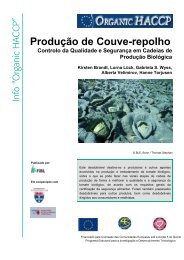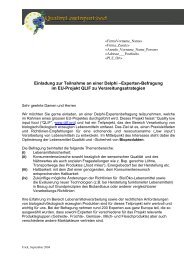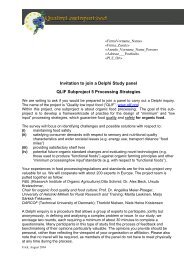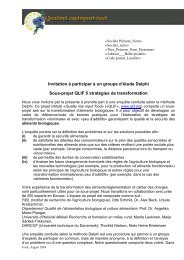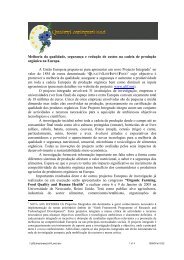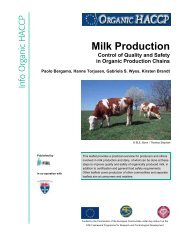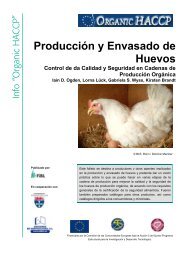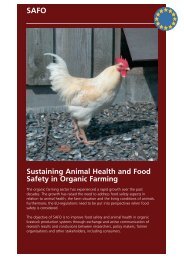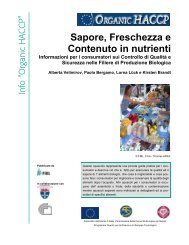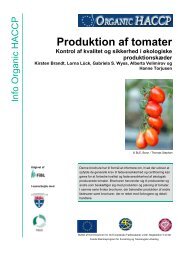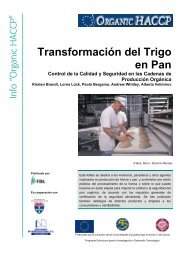ORGANIC SEED PROPAGATION: CURRENT STATUS AND ...
ORGANIC SEED PROPAGATION: CURRENT STATUS AND ...
ORGANIC SEED PROPAGATION: CURRENT STATUS AND ...
You also want an ePaper? Increase the reach of your titles
YUMPU automatically turns print PDFs into web optimized ePapers that Google loves.
ENVIRFOOD<br />
FP6-2003-SSA-1-007003<br />
Deliverable 4<br />
Sweden. The most common problem for seed lots’ rejection is germination and the second<br />
common is variety purity, and the third common is seed moisture. More information about<br />
seed quality in different crops in Sweden could be got contacting Swedish Seed Testing and<br />
Certification Institute (www.utsadeskontrollen.se).<br />
Denmark. There can be different reasons depending on species, but the most common are<br />
seed health and germination.<br />
About 5 – 10 % of the seed lots are rejected in Belgium. During the field inspection the main<br />
reason is lack of variety purity, but in laboratory test – germination.<br />
The last question clarified was about derogation system in European countries<br />
for the cases when organic seed supply is insufficient.<br />
The EEC Regulation No. 2092/91 states that organic seeds shall be used where available.<br />
However, it allows non-organic seed to be used where no suitable/appropriate organic<br />
alternative is available. The EC Regulation No. 1452/2003 does not allow treated seed to be<br />
used any longer (as of January 1, 2004). There are also no grounds for a derogation to use<br />
non-organic seed on the grounds of seed quality if the variety a user wants to use is registered<br />
in the database. Availability of the seed should be transparent. Transparency should be<br />
provided by electronic databases, which would contain information about availability of seed<br />
(see above section about Organic seed databases). Derogation system and derogations issued<br />
during 2004 vary from country to country.<br />
United Kingdom. Application to use non-organic seed in line with European Council<br />
Regulation (EEC) No. 2092/91 and European Commission Regulation (EC) No. 1452/2003<br />
has to be addressed to Certification body. Application form that should be used for single<br />
varieties of seed, for grass & forage mixes and for seed potatoes can be found in database web<br />
page. Certification body needs the reason(s) for wanting to use non-organic seed before any<br />
purchases. Where grass& forage mixes are used containing 50 % or more organic seed, details<br />
of the non-organic seed within the mix can be submitted to certification body after purchase.<br />
However derogation must be obtained prior to your next inspection.<br />
Single seed varieties: if variety that you require is not available as organic seed, and<br />
alternative varieties of the same crop are not suitable your certification body will consider<br />
your request to use non-organic seed. The justification must be from the following list:<br />
1. No variety of the species which I want to use are registered in the UK organic seed<br />
database;<br />
2. The seed supplier is unable to deliver the seed or seed potato before sowing or<br />
planting despite ordering the seed or seed potato in reasonable time;<br />
3. The variety which I want to use is not registered in the database and I can demonstrate<br />
that none of the registered alternatives of the same species are appropriate for my<br />
production (you will need to indicate the reason they are not appropriate);<br />
4. For research purposes;<br />
5. To test in small-scale field trials;<br />
6. For variety conservation purposes;<br />
7. The seed is part of a grass or forage mix containing at least 50 % organic seed.<br />
From 31 December 2004, DEFRA (Department for Environment, Food and Rural<br />
Affairs, UK) will require organic farmers to sow organic grass and forage seed mixes<br />
with a minimum organic content of 60 per cent by weight. This requirement will stand<br />
until 31 December 2006 (Centre for organic seed information (COSI:<br />
www.cosi.org.uk; www.soilassociation.org))<br />
9




